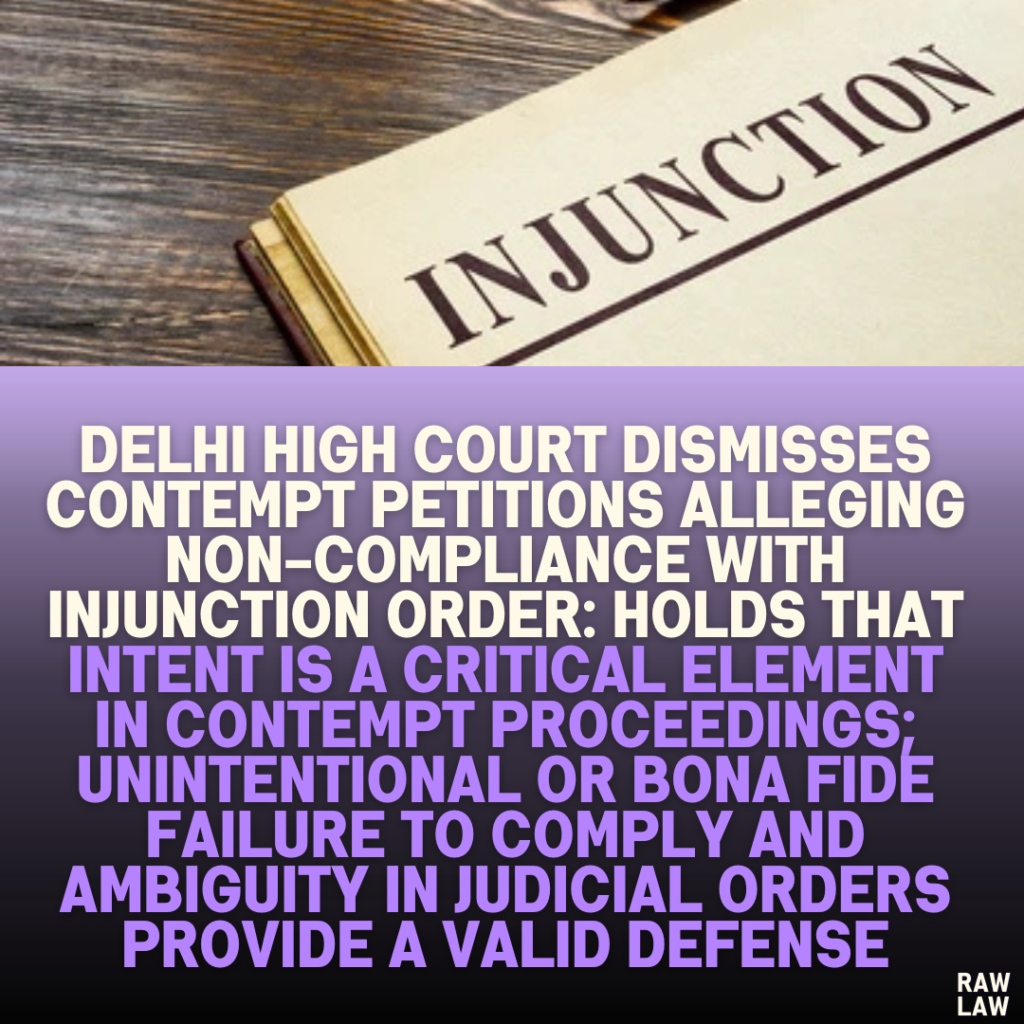Court’s Decision:
The Delhi High Court dismissed the contempt petitions, holding that the sale of the Siraspur property did not amount to contempt of court. The court clarified that its earlier injunction order of June 3, 2022, expressly acknowledged the prior rights of financial institutions over such properties. Therefore, the respondents’ actions did not constitute willful disobedience of the court’s directives.
Facts:
- Background of the Case:
- The petitioner alleged that the respondents violated a court order restraining the alienation or creation of third-party rights over certain immovable properties, including the Siraspur property.
- The order, however, allowed such actions subject to the “prior rights” of financial institutions.
- Nature of the Dispute:
- The respondents sold the Siraspur property and used the proceeds to fulfill financial obligations arising from a one-time settlement (OTS) agreement with a consortium of banks.
- The petitioner alleged that the sale was done without court approval and claimed it violated the injunction order.
- Respondents’ Position:
- The respondents argued that the sale complied with the court order since it recognized the financial institutions’ prior rights.
- The proceeds of the sale were directly deposited into a Trust and Retention Account (TRA) managed by the consortium of banks.
Issues:
- Was the sale of the Siraspur property a breach of the court’s order dated June 3, 2022?
- Did the respondents’ actions constitute willful disobedience, thereby amounting to contempt of court?
Petitioner’s Arguments:
- The petitioner asserted that the sale violated the court order, which prohibited alienating the property.
- They contended that:
- The property was not mortgaged.
- The consortium of banks did not mandate the sale.
- The sale was undertaken to evade judicial scrutiny.
- They alleged that the sale demonstrated willful disobedience and was intended to overreach the court’s directives.
Respondents’ Arguments:
- The respondents maintained that the court’s order explicitly permitted actions subject to the financial institutions’ prior rights.
- They submitted evidence to show:
- The Siraspur property was charged to financial institutions under a prior agreement.
- The proceeds were used to satisfy outstanding dues as part of an OTS arrangement.
- The respondents emphasized that the sale was undertaken in good faith to resolve financial obligations, not in defiance of the court.
Analysis of the Law:
- Contempt Jurisdiction:
- Under Section 2(b) of the Contempt of Courts Act, 1971, “civil contempt” requires proof of willful disobedience.
- Intent is a critical element; unintentional or bona fide failure to comply does not constitute contempt.
- Scope of Judicial Injunctions:
- The court emphasized that injunctions must be clear and unequivocal. Any ambiguity in the language of the order provides a valid defense against contempt allegations.
- Interpretation of “Prior Right”:
- The term “prior right” in the court’s order was interpreted to include financial obligations under agreements such as charges or hypothecations.
Precedent Analysis:
- Intent as a Critical Factor:
- The court relied on precedents such as Rama Narang v. Ramesh Narang and Ram Kishan v. Tarun Bajaj, which highlight the necessity of intent in proving contempt.
- Quasi-Criminal Nature of Contempt:
- Citing Rosnan Sam Boyce v. B.R. Cotton Mills Ltd., the court noted that contempt proceedings are quasi-criminal and require proof beyond a reasonable doubt.
- Ambiguity and Good Faith:
- The court referred to cases such as Bathina Ramakrishna Reddy v. State of Madras, which emphasized that ambiguity in orders precludes contempt findings.
Court’s Reasoning:
- Prior Rights of Financial Institutions:
- Evidence showed that the Siraspur property was charged to banks under agreements pre-dating the court’s order.
- The order itself recognized such prior rights, insulating the sale from contempt allegations.
- Bona Fide Action:
- The sale proceeds were directly deposited into the TRA account managed by the banks and used to repay loans.
- The court found the respondents’ actions consistent with their financial obligations, indicating good faith.
- No Intent to Violate:
- The court highlighted that willful disobedience requires intent to defy the court order.
- Here, the respondents acted within the framework of the injunction, which acknowledged financial institutions’ rights.
Conclusion:
The High Court concluded that:
- The sale of the Siraspur property was conducted in compliance with the court order and to meet financial obligations.
- There was no willful or deliberate violation of the court’s injunction.
- The contempt petitions were dismissed as no case of contempt was made out.
Implications:
- The judgment underscores the importance of clear judicial orders, particularly in cases involving financial institutions.
- It reaffirms that contempt requires proof of willful disobedience, not mere non-compliance.
- The ruling protects financial institutions’ rights and clarifies their precedence over certain judicial restraints.



